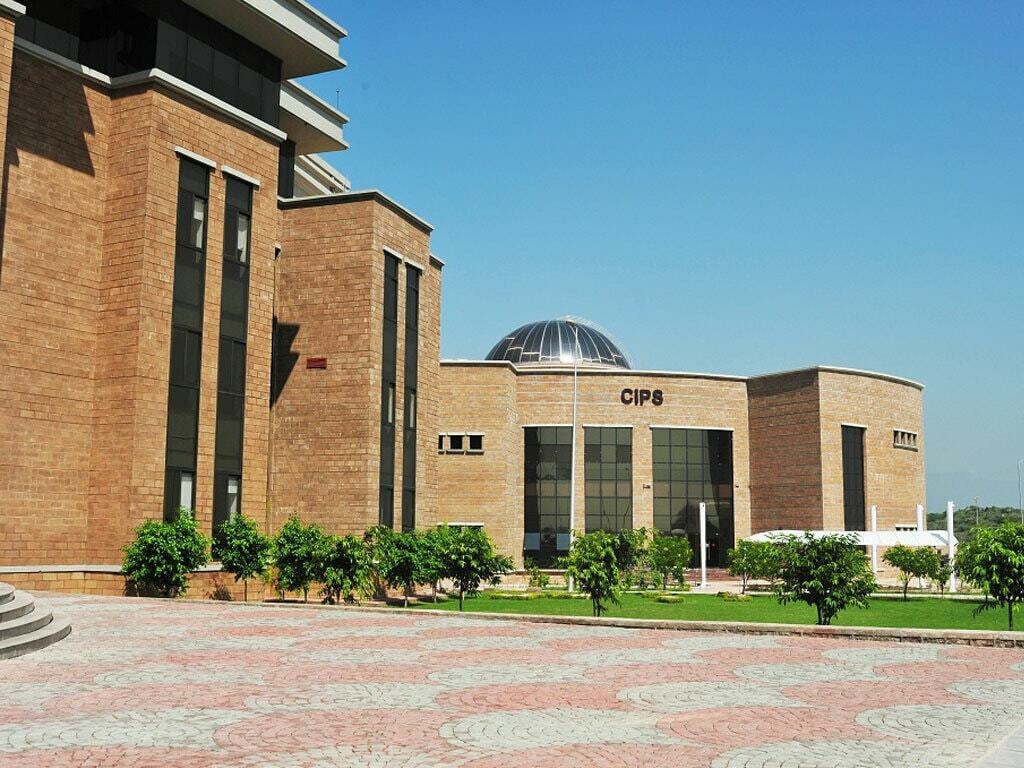How to install the app on iOS
Follow along with the video below to see how to install our site as a web app on your home screen.
Note: This feature may not be available in some browsers.
You are using an out of date browser. It may not display this or other websites correctly.
You should upgrade or use an alternative browser.
You should upgrade or use an alternative browser.
Pakistan Education updates
- Thread starter ghazi52
- Start date
ghazi52
PDF THINK TANK: ANALYST

- Joined
- Mar 21, 2007
- Messages
- 103,086
- Reaction score
- 106
- Country
- Location
,.,.,.
The Saudi Arabia government has announced fully funded scholarships for Pakistani students to study at diploma, bachelor's, master's, and PhD levels in 25 top universities of the kingdom. Students residing in Pakistan and legal resident of KSA both can apply for these scholarships.
75 per cent students will be awarded scholarship from Pakistan whereas 25 per cent scholarships will be given to Pakistani students residing in the Kingdom.
The successful candidates will also be provided with monthly stipend and other facilities.
According to the Higher Education Commission of Pakistan (HEC), the scholarships have been announced in the disciplines of politics, law, education, administration, economics, engineering, computer science, agriculture, Arabic, Islamic Studies and media sciences.
The science students securing the scholarships will be given a monthly stipend of 900 Saudi Riyal (SR) and 850 SR monthly allowance will be given to humanities students.
Moreover, those securing admission at the varsities will be provided with a return ticket as well as free medical facilities.
The applicants, hailing from Pakistan and Azad Jammu and Kashmir (AJK), should be aged between 17 to 25 years for Bachelor's programme, must be below 30 years for Master's programme and less than 35 for PhD programme on closing date of the application portal of respective university.
Each university is authorised to enroll only five per cent of the international students except for Princess Noor Binte Abdul Rehman University for girls, Riyadh and Jamia Islamia Madinah Munawara, where the percentage on scholarship is eight per cent.
Jamia Islamia Madinah Munawara will grant admission on scholarship 85 per cent of the total seats.
The scholarship covers free lodging; three months furnishing allowance on arrival in KSA for married scholars; return air ticket; free medical for the students and his/her family, if married; three months graduation allowance for shipment of books; subsidised meal at the campus; sports and recreational activities on the campus; and support for dependents and travel expenses.
The Saudi Arabia government has announced fully funded scholarships for Pakistani students to study at diploma, bachelor's, master's, and PhD levels in 25 top universities of the kingdom. Students residing in Pakistan and legal resident of KSA both can apply for these scholarships.
75 per cent students will be awarded scholarship from Pakistan whereas 25 per cent scholarships will be given to Pakistani students residing in the Kingdom.
The successful candidates will also be provided with monthly stipend and other facilities.
According to the Higher Education Commission of Pakistan (HEC), the scholarships have been announced in the disciplines of politics, law, education, administration, economics, engineering, computer science, agriculture, Arabic, Islamic Studies and media sciences.
The science students securing the scholarships will be given a monthly stipend of 900 Saudi Riyal (SR) and 850 SR monthly allowance will be given to humanities students.
Moreover, those securing admission at the varsities will be provided with a return ticket as well as free medical facilities.
The applicants, hailing from Pakistan and Azad Jammu and Kashmir (AJK), should be aged between 17 to 25 years for Bachelor's programme, must be below 30 years for Master's programme and less than 35 for PhD programme on closing date of the application portal of respective university.
Each university is authorised to enroll only five per cent of the international students except for Princess Noor Binte Abdul Rehman University for girls, Riyadh and Jamia Islamia Madinah Munawara, where the percentage on scholarship is eight per cent.
Jamia Islamia Madinah Munawara will grant admission on scholarship 85 per cent of the total seats.
The scholarship covers free lodging; three months furnishing allowance on arrival in KSA for married scholars; return air ticket; free medical for the students and his/her family, if married; three months graduation allowance for shipment of books; subsidised meal at the campus; sports and recreational activities on the campus; and support for dependents and travel expenses.
Luosifen
FULL MEMBER

- Joined
- Feb 17, 2022
- Messages
- 743
- Reaction score
- 0
- Country
- Location
First Batch of 90 Pakistani students left for China
By Zafar Hussain | Gwadar Pro Jun 20, 2022
BEIJING, June 20 (Gwadar Pro) - The first batch of 90 Pakistani students, who were stuck in Pakistan due to the COVID-19 pandemic, left Islamabad for Xi’an, China via Pakistan International Airlines (PIA), charter flight PK6854 on Monday.
A total of 105 students reached the Islamabad International Airport but 15 students failed to pass the PCR test and had to wait for the next flight.
In order to facilitate Pakistani students, this is a pilot project of sending the first batch of students back to China, whichhas been a tremendous team effort led by the federal minister of education and all other stakeholders, the Pakistan Ministry of Education stated.
Dr Asmat Malik requested all students to follow the strict standard operating procedure (SOP) that the remaining students' future is dependent on their successful journey.
"Alhamdolillah the student's pre-departure PCR tests are negative. Good luck for the 1st batch of Pak students. Rapid Test will be conducted on Nayab Lab Airport Desk within 12 hours of flight departure", he expressed.
Pakistani students showed happiness and expressed their emotional feelings at the airport.
Last month, Pakistani Foreign Minister Bilawal Bhutto Zardari visited Guangzhou, where he thanked the Chinese State Councilor and Foreign Minister Wang Yi for the safe and secure return of Pakistani students in a phased manner to China.
During the meeting, the two sides also decided to resume a direct flight between the two countries carried out by Pakistan International Airlines at the earliest and subsequently increase direct flights based on the changinpandemic situation.

First Batch of 90 Pakistani students left for China
BEIJING, June 20 (Gwadar Pro) - The first batch of 90 Pakistani students, who were stuck in Pakist
Luosifen
FULL MEMBER

- Joined
- Feb 17, 2022
- Messages
- 743
- Reaction score
- 0
- Country
- Location

Strengthen Confidence in China-Pakistan Joint Academic Degrees Development: Expert
ISLAMABAD, June 21. (Gwadar Pro)- “A group of high-level talents with strict professional and cultur
By Mariam Raheem | Gwadar Pro Jun 21, 2022
ISLAMABAD, June 21. (Gwadar Pro)- “A group of high-level talents with strict professional and cultural training is critical for the construction of China-Pakistan Economic Corridor (CPEC). China and Pakistan should strengthen cooperation and promote joint degrees to meet the needs of the two countries,” highlighted Prof. Tan Biyou from Hunan Normal University on Saturday.
On the 2nd South Asia Forum with the theme of “Pakistan in social transition” hosted by China-Pakistan Educational Cultural Institute (CPECI), Prof. Tan said that if engineers at all levels involved in management and operation do not truly understand the people at the bottom of Pakistan and do not know how to interact with them effectively and safely, it will bring great risk to the multibillion-dollar investment and pose a threat to the personal safety of Chinese managers.
In fact, talent is the most scarce resource for the Belt and Road Initiative, including CPEC. Prof. Tan emphasized the need to expand the scope of joint degree programs and cultivate more talents. He explained that, “A group of high-level talents proficient in Chinese and Pakistani culture, including masters and doctors, in the joint degree program jointly engaged by Chinese and Pakistani universities is a must.”
CPEC is a new development in the history of China-Pakistan exchanges. It not only promotes economic cooperation, but also brings about broad cooperation in education and culture. In this context, the joint degree was put on the agenda.
China-Pakistan cooperation in education has gone through a long period of exploration and has been continuous since the establishment of diplomatic relations between China and Pakistan in 1951.
Nevertheless, due to the different national conditions of the two countries, in the long historical period, China-Pakistan friendship is mainly limited to political and military cooperation, and the development of educational cooperation is relatively slow.
Since about 2003, the number of Pakistani students studying in China has been increasing. However, further collaboration between universities is generally limited.
In 2005, when China and Pakistan exchanged the Treaty of Good-Neighborliness and Friendly Cooperation, education was listed as a separate section for the first time.
The Confucius Institutes, which were widely established in Pakistan, were an important result of the treaty. The Confucius Institutes mainly carry out language teaching, not degree education.
In the Joint Statement on Strengthening China-Pakistan All-Weather Strategic Cooperative Partnership, Building Closer China-Pakistan Community of Shared Future in the New Era issued in 2018, China and Pakistan agreed to encourage respective universities to develop bilateral linkages including through joint degree and exchange programmes.
On March 2022, China and Pakistan signed an agreement on mutual recognition of higher education certificates and degrees, providing study guarantee for international students from both countries and dispelling their concerns.
In terms of the future development direction of the joint degree, Prof. Tan believes that it is necessary to reinforce the confidence of the cooperation.
“We should decentralize the cooperation projects, minimize the number of projects, tilt the cooperation center toward the universities in Islamabad, and establish a regional center of appropriate size.” Prof. Tan concluded.
313ghazi
ELITE MEMBER

- Joined
- Mar 14, 2017
- Messages
- 12,932
- Reaction score
- 45
- Country
- Location
,.,.,.
The Saudi Arabia government has announced fully funded scholarships for Pakistani students to study at diploma, bachelor's, master's, and PhD levels in 25 top universities of the kingdom. Students residing in Pakistan and legal resident of KSA both can apply for these scholarships.
75 per cent students will be awarded scholarship from Pakistan whereas 25 per cent scholarships will be given to Pakistani students residing in the Kingdom.
The successful candidates will also be provided with monthly stipend and other facilities.
According to the Higher Education Commission of Pakistan (HEC), the scholarships have been announced in the disciplines of politics, law, education, administration, economics, engineering, computer science, agriculture, Arabic, Islamic Studies and media sciences.
The science students securing the scholarships will be given a monthly stipend of 900 Saudi Riyal (SR) and 850 SR monthly allowance will be given to humanities students.
Moreover, those securing admission at the varsities will be provided with a return ticket as well as free medical facilities.
The applicants, hailing from Pakistan and Azad Jammu and Kashmir (AJK), should be aged between 17 to 25 years for Bachelor's programme, must be below 30 years for Master's programme and less than 35 for PhD programme on closing date of the application portal of respective university.
Each university is authorised to enroll only five per cent of the international students except for Princess Noor Binte Abdul Rehman University for girls, Riyadh and Jamia Islamia Madinah Munawara, where the percentage on scholarship is eight per cent.
Jamia Islamia Madinah Munawara will grant admission on scholarship 85 per cent of the total seats.
The scholarship covers free lodging; three months furnishing allowance on arrival in KSA for married scholars; return air ticket; free medical for the students and his/her family, if married; three months graduation allowance for shipment of books; subsidised meal at the campus; sports and recreational activities on the campus; and support for dependents and travel expenses.
Good news as long as it's not more religious degrees.
Maula Jatt
ELITE MEMBER

- Joined
- Jul 24, 2021
- Messages
- 10,697
- Reaction score
- 19
- Country
- Location
@waz @Irfan Baloch
Would it be appropriate to go on Indian threads and troll them with posting photos from their slums or thier lack of toilets with people lining up on train tracks to do the deed?
_NOBODY_
SENIOR MEMBER

- Joined
- Jan 6, 2016
- Messages
- 3,327
- Reaction score
- 4
- Country
- Location
It's only temporary, this will be over after Eid.
ghazi52
PDF THINK TANK: ANALYST

- Joined
- Mar 21, 2007
- Messages
- 103,086
- Reaction score
- 106
- Country
- Location
.,.,.,
16 Jul, 2022

ISLAMABAD: With the aim to forge meaningful partnership under the proposed “Silk Road International Alliance of Architectural & Technological Universities” and beyond, a high-level virtual meeting between senior management and faculty of the National University of Sciences & Technology (NUST), Pakistan and Xi’an University of Architecture & Technology (XAUAT), China, was held on Friday.
Engr Javed Mahmood Bukhari, Rector NUST, and Prof Wang Shusheng, President XAUAT also addressed the meeting. The proposed alliance has a mandate to build a knowledge library, information hub, and talent base in the fields of Architecture and Technology to extend support for the urbanisation of countries along the Silk Road.
Addressing the session, Rector NUST said that we are truly excited to work closely with XAUAT on the ambitious Silk International Alliance of Architectural & Technological Universities. He was highly optimistic that this alliance would result in significant value addition to our knowledge ecosystems and help improve quality of our programmes and research through mutual learning.
The Rector observed that in the past few years, Belt and Road initiative of China, and within that China-Pakistan Economic Corridor has brought about fresh opportunities, while opening new intellectual vistas of excellence at NUST.
He maintained that these initiatives have tied together Pakistan and China into a partnership of great mutual benefit with shared destiny and prosperity for the people of both the countries. President XAUAT also looked forward to strengthening bilateral cooperation with NUST in general, and achieving objectives of the alliance in particular.
Copyright Business Recorder, 2022
NUST, Chinese varsity to work on ‘Silk Road International Alliance of Architectural & Technological Universities’
B R16 Jul, 2022

ISLAMABAD: With the aim to forge meaningful partnership under the proposed “Silk Road International Alliance of Architectural & Technological Universities” and beyond, a high-level virtual meeting between senior management and faculty of the National University of Sciences & Technology (NUST), Pakistan and Xi’an University of Architecture & Technology (XAUAT), China, was held on Friday.
Engr Javed Mahmood Bukhari, Rector NUST, and Prof Wang Shusheng, President XAUAT also addressed the meeting. The proposed alliance has a mandate to build a knowledge library, information hub, and talent base in the fields of Architecture and Technology to extend support for the urbanisation of countries along the Silk Road.
Addressing the session, Rector NUST said that we are truly excited to work closely with XAUAT on the ambitious Silk International Alliance of Architectural & Technological Universities. He was highly optimistic that this alliance would result in significant value addition to our knowledge ecosystems and help improve quality of our programmes and research through mutual learning.
The Rector observed that in the past few years, Belt and Road initiative of China, and within that China-Pakistan Economic Corridor has brought about fresh opportunities, while opening new intellectual vistas of excellence at NUST.
He maintained that these initiatives have tied together Pakistan and China into a partnership of great mutual benefit with shared destiny and prosperity for the people of both the countries. President XAUAT also looked forward to strengthening bilateral cooperation with NUST in general, and achieving objectives of the alliance in particular.
Copyright Business Recorder, 2022
Luosifen
FULL MEMBER

- Joined
- Feb 17, 2022
- Messages
- 743
- Reaction score
- 0
- Country
- Location

Swat University to set up Pak-China Research Centre of Economic Development
MINGORA,Jul.18(Gwadar Pro) - The Government of Khyber Pakhtunkhwa (KP) has allocated funds for the e
Swat University to set up Pak-China Research Centre of Economic Development
By Tahir Ali | Gwadar Pro Jul 18, 2022
MINGORA,Jul.18(Gwadar Pro) - The Government of Khyber Pakhtunkhwa (KP) has allocated funds for the establishment of the Pak-China Research Centre of Economic Development (PCRCED) at the University of Swat.
With an estimated cost of Rs 1,230.540 million, the project will be completed in five years. In its budget for the fiscal year 2022-2023, KP has allocated Rs 56.420 million, while the balance will be released in the coming years.
The proposed Pak-China Research Centre will facilitate the study and research on diverse arts, cultures, history, and politics of China and the Swat valley. Through exchange programs, the Center can further enhance people-to-people contact between Swat valley and the Xinjiang Uygur Autonomous Region of China. They already have centuries-old cultural and business ties, as geographically Swat valley and Xinjiang are not far from each other -- only Gilgit-Baltistan lies between them.
“PCRCED will serve as a think tank and research center for research studies on matters of mutual interest between Pakistan and China,” the University of Swat Vice-Chancellor Professor Dr. Hassan Sher told Gwadar Pro, adding that the Center is expected to “contribute immensely to the students, people of the areas and the country”.
According to the Vice-Chancellor, the University of Swat is located on the main route of China-Pakistan Economic Corridor (CPEC), which is a flagship project of the Belt and Road Initiative (BRI), thus increasing the value of the proposed institute. “The Center will also develop a mechanism to prepare graduates to fully exploit opportunities arising out of CPEC and related projects,” he said.
In the context of the "Pakistan Vision 2025" which emphasizes indigenous resources for economic development, Dr. Hassan Sher said that the Center would use local resources for the development of the local community and Pakistan as a whole.
Even as an idea, PCRCED is creating enthusiasm among the people of Swat. Once operational, it will not only help the development of Swat and neighboring areas, but also will give youth the great opportunity of working, earning, and remaining in their ancestral areas rather than undertaking internal or external migration -- which comes at great personal and national cost.
There are countless ways via which the center can contribute: training and developing local human resources required down the road in the implementation of CPEC long-term plan; and developing the capacity of other Pakistani universities to provide useful policy inputs to the Government relating to the CPEC long-term plan. The center can play an important role in understanding the history, culture, and governance systems that have made possible the "Chinese miracle" -- how in some seven decades, China lifted itself out of poverty to become a world power.
PCRCED wants to become a model mini-flagship project in the larger CPEC and BRI context and plans to be in touch with the Chinese Embassy in Islamabad in the near future, to revive and expand its centuries-old ties with China.
ghazi52
PDF THINK TANK: ANALYST

- Joined
- Mar 21, 2007
- Messages
- 103,086
- Reaction score
- 106
- Country
- Location
.,.,
Aga Khan University and Accelerate Prosperity Pakistan have launched applications for the 3rd cohort of the National Health Incubator- Pakistan’s first and only health incubator.
National Health Incubator is led by the pioneers of health tech in Pakistan, bringing together subject matter experts from Aga Khan University and an excellent team of business coaches and mentors from Accelerate Prosperity to support the growth and investment readiness of selected entrepreneurs.
NHI brings together all the essential elements of a high-quality incubation program to facilitate aspiring and existing entrepreneurs to create and commercialize innovative health products/ services by offering access to subject matter experts from AKU, tailored financing solutions, exclusive access to insights and data, one on one business coaching and blended learning courses in entrepreneurship to fuel exponential growth of the cohort businesses.
Last year AP and AKU secured a starring cohort with some high-growth businesses like Alsons Technology and medIQ , both now in the process of scaling their operations!
NHI, this year is looking for:
● Innovative ideas in health tech with a Minimum Viable Product
● Startups with revenue streams striving to advance health tech
● Existing healthcare providers exploring to adopt new or existing healthcare tech or innovation
Application Close on 5th August 2022
Link to apply
 enketo.ona.io
enketo.ona.io
Aga Khan University and Accelerate Prosperity Pakistan have launched applications for the 3rd cohort of the National Health Incubator- Pakistan’s first and only health incubator.
National Health Incubator is led by the pioneers of health tech in Pakistan, bringing together subject matter experts from Aga Khan University and an excellent team of business coaches and mentors from Accelerate Prosperity to support the growth and investment readiness of selected entrepreneurs.
NHI brings together all the essential elements of a high-quality incubation program to facilitate aspiring and existing entrepreneurs to create and commercialize innovative health products/ services by offering access to subject matter experts from AKU, tailored financing solutions, exclusive access to insights and data, one on one business coaching and blended learning courses in entrepreneurship to fuel exponential growth of the cohort businesses.
Last year AP and AKU secured a starring cohort with some high-growth businesses like Alsons Technology and medIQ , both now in the process of scaling their operations!
NHI, this year is looking for:
● Innovative ideas in health tech with a Minimum Viable Product
● Startups with revenue streams striving to advance health tech
● Existing healthcare providers exploring to adopt new or existing healthcare tech or innovation
Application Close on 5th August 2022
Link to apply
Enketo Smart Paper for Ona
ghazi52
PDF THINK TANK: ANALYST

- Joined
- Mar 21, 2007
- Messages
- 103,086
- Reaction score
- 106
- Country
- Location
Khyber Medical College, Peshawar University..

Khyber Medical College, Peshawar, 1954 (c).
In 1954, the foundation stone of Khyber Medical College, as faculty of Medicine, of Peshawar University, was laid by the then Governor General of Pakistan, Mr. Ghulam Muhammad. The College started functioning in 1955 with enrollment of fifty students with meager facilities.

Khyber Medical College, Peshawar, 1954 (c).
In 1954, the foundation stone of Khyber Medical College, as faculty of Medicine, of Peshawar University, was laid by the then Governor General of Pakistan, Mr. Ghulam Muhammad. The College started functioning in 1955 with enrollment of fifty students with meager facilities.
Last edited:
ghazi52
PDF THINK TANK: ANALYST

- Joined
- Mar 21, 2007
- Messages
- 103,086
- Reaction score
- 106
- Country
- Location
Forest Institute Peshawar..

Front View Of The Main Building Of Pakistan Forest Institute, Peshawar,1960's (c).
There is a ROSE Garden on the left side of the Forest Institute building.
A sprawling Rose Garden is visible in the photo; It stretches along the road up to the end of frontline. It grows a wide variety of roses, planted with such a precision that viewers get a fantastic display of colours in flower arrangement. Total of nearly 250 samples of Roses..
There were many beautiful flowers and cactus plants from all over the world. Black and green roses in the rose garden.
The fragrance in air was just like a perfume from heaven.


Pakistan Forest Institute (PFI) was established in 1947 at Faisalabad in order to complete the training of the students who had migrated to Pakistan after independence. In April, 1948 the PFI was shifted to Upper Topa, Murree hills and then in October, 1951 to Abbottabad.
The construction of its present permanent building complex in the Peshawar University Campus was started in 1955 and completed over a period of about 10 years. During this period, main building consisting of offices, laboratories and workshops, students’ hostels and residential colony were constructed.
It started as a training institution, however, research was started soon after its establishment when research branches were created in it e.g., Forest Utilization (1947), Forest Entomology (1949), Forest Botany (1951), Forest Chemistry (1952), Medicinal Plants (1953) and Silviculture (1956). The staff of these branches also participate in training activities through teaching of the subjects of their specialization to the students of the Institute in addition to conducting research. The Institute is affiliated with the University of Peshawar since 1958 for the purpose of examinations and award of degrees in Forestry.
Pakistan Forest Institute is a Provincial Government Organization of which the administration changed hands many times. For instance, it was administered initially by the Federal Ministry of Food and Agriculture. It was transferred to the Provincial Agriculture Department of Government of West Pakistan in 1965, and then to the Agriculture Department of N.W.F.P. (Board of Governor) in 1969.
The Institute was transferred back to the Ministry of Food, Agriculture and Cooperatives, Government of Pakistan on 1st July, 1977. From September, 1995 to February 1997, it remained under the control of Ministry of Environment, Urban Affairs, Forestry and Wildlife.
Since March, 1997 to 30th June, 2011 it was under Ministry of Environment, Government of Pakistan, Islamabad. The institute has been devolved to Forestry, Environment and Wildlife Department, Khyber Pakhtunkhwa with effect from 1st July, 2011.
Front View Of The Main Building Of Pakistan Forest Institute, Peshawar,1960's (c).
There is a ROSE Garden on the left side of the Forest Institute building.
A sprawling Rose Garden is visible in the photo; It stretches along the road up to the end of frontline. It grows a wide variety of roses, planted with such a precision that viewers get a fantastic display of colours in flower arrangement. Total of nearly 250 samples of Roses..
There were many beautiful flowers and cactus plants from all over the world. Black and green roses in the rose garden.
The fragrance in air was just like a perfume from heaven.
Pakistan Forest Institute (PFI) was established in 1947 at Faisalabad in order to complete the training of the students who had migrated to Pakistan after independence. In April, 1948 the PFI was shifted to Upper Topa, Murree hills and then in October, 1951 to Abbottabad.
The construction of its present permanent building complex in the Peshawar University Campus was started in 1955 and completed over a period of about 10 years. During this period, main building consisting of offices, laboratories and workshops, students’ hostels and residential colony were constructed.
It started as a training institution, however, research was started soon after its establishment when research branches were created in it e.g., Forest Utilization (1947), Forest Entomology (1949), Forest Botany (1951), Forest Chemistry (1952), Medicinal Plants (1953) and Silviculture (1956). The staff of these branches also participate in training activities through teaching of the subjects of their specialization to the students of the Institute in addition to conducting research. The Institute is affiliated with the University of Peshawar since 1958 for the purpose of examinations and award of degrees in Forestry.
Pakistan Forest Institute is a Provincial Government Organization of which the administration changed hands many times. For instance, it was administered initially by the Federal Ministry of Food and Agriculture. It was transferred to the Provincial Agriculture Department of Government of West Pakistan in 1965, and then to the Agriculture Department of N.W.F.P. (Board of Governor) in 1969.
The Institute was transferred back to the Ministry of Food, Agriculture and Cooperatives, Government of Pakistan on 1st July, 1977. From September, 1995 to February 1997, it remained under the control of Ministry of Environment, Urban Affairs, Forestry and Wildlife.
Since March, 1997 to 30th June, 2011 it was under Ministry of Environment, Government of Pakistan, Islamabad. The institute has been devolved to Forestry, Environment and Wildlife Department, Khyber Pakhtunkhwa with effect from 1st July, 2011.
Luosifen
FULL MEMBER

- Joined
- Feb 17, 2022
- Messages
- 743
- Reaction score
- 0
- Country
- Location

Chinese teachers impart e-commerce skills
KARACHI: China is helping two state-run institutions offer online courses to help people sell produc
Chinese teachers impart e-commerce skills
By Staff Reporter | The Express Tribune Jul 27, 2022
KARACHI:
China is helping two state-run institutions offer online courses to help people sell products and services in the Chinese market.
Dawood Engineering University and Sindh Technical Board jointly launched several courses to develop Chinese entrepreneurship among the youth with the collaboration of China. Under the programme, Chinese teachers and business professionals are providing online classes on Chinese business entrepreneurship and expanding Pakistani product marketing. The business courses will also teach the youth about global business trends worldwide.
Sindh Technical Board Chairman Dr Masroor Shaikh told The Express Tribune that Technical Board and Dawood Engineering University are jointly conducting these courses with the assistance of Hunan Chemical and Vocational Technical College, China. He said that these courses were designed with the new academic standards in mind.
Besides encouraging the young generation to establish a business, the course will teach them how to operate a low-cost online business, he said. Sheikh further said that the Chinese companies are increasing the daily hiring well informed and technology-trained English-speaking workforce. BRI acts as the foundation for online sales and cross-border e-commerce activities in 152 other countries to sell Chinese products and services.
He said that the two educational institutions had taken these measures to alleviate unemployment in youth, provide the youth with overseas employment opportunities, and enhance relations between Pakistan and China educational institutions.
The courses will begin on July 19 at Dawood University of Engineering and Technology. He further said that a Memorandum of Understanding (MoU) was recently signed on the Model Sino-Pak Dual Diploma Vocational and Technical Joint Educational Programme.
Similar threads
- Replies
- 0
- Views
- 780
- Replies
- 0
- Views
- 206
